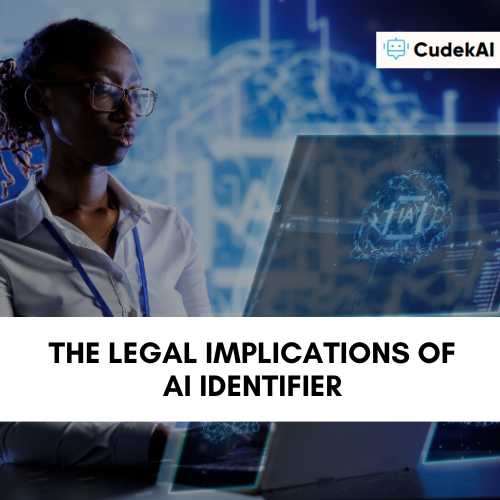The Legal Implications of AI Identifier

AI identifier, such as AI content detector, is an important part of several industries like customer service, content creation, and academic writing. As these technologies are improving every day, their implication is not without legal challenges. In this blog, we will talk about legal issues surrounding tools like AI content detectors. We will shed light on the important factors regarding privacy concerns and the potential for bias, and provide businesses with essential insights so that you can effectively use these tools.
What is an AI Identifier and what should you know?

AI identifier or AI-generated text detector is an artificial intelligence tool that is used to identify text that is being written by an AI tool like Chatgpt. These detectors can analyze those fingerprints that are left by AI technologies, which a human eye may not detect. By doing so, they can easily recognize between an AI text and the one that is written by humans. This training allows the models to learn the difference between the lack of human insights and over-symmetrical features in generated images. In text, AI identifiers look for repetition, and unnatural language structures that are created by chatbots.
Legal frameworks and regulations
Legal frameworks require various rules and regulations that rule digital content and its privacy. The number one is GDPR. It is mainly concerned with the privacy and data protection of individuals within the European Union. It puts strict regulations on data handling that directly impact AI detectors. Under GDPR, any entity that is using AI to detect content that includes personal data must ensure transparency. Therefore businesses who are using AI identifiers or AI content detectors must implement rules to comply with GDPR’s consent requirements.
DMCA works by providing a legal framework to address copyright issues that are related to digital media in the USA. AI content detector helps platforms follow the DMCA rules by reporting copyright issues. There are other laws such as the California Consumer Privacy Act and the Children’s Online Privacy Protection Act. They also impact how this AI-generated text detector is used. All of these laws require strict privacy protections. This also includes getting clear permission when collecting data from minors.
Privacy concerns
To function properly, the AI detector needs to analyze the content. By this we mean it needs to examine blogs, texts, photographs, or even videos that contain different information. However if not handled properly, there is a risk that this data can be misused without proper consent.
After this step of data collection, there is a need to store data in the right place. If it is not secured with proper security measures, hackers can easily have access to the potential data and they can mishandle it in any way.
The data processing of AI content detectors can also be a concern. They use algorithms to detect and analyze the details in the content. If these algorithms are not designed with privacy in mind, it is easier for them to reveal confidential information that is meant to be a secret. Therefore, businesses and developers need to keep their content private and implement strong security to it as there are higher chances of breaching.
Ethical considerations
AI content detectors can be biased if their algorithms are trained on unrepresentative datasets. This can lead to inappropriate results such as flagging human content as AI content. To minimize the chances of bias, it is mandatory to train them on diverse and inclusive datasets.
Transparency is also very crucial in how AI content detectors operate and function. Users should know how these tools make decisions especially when these decisions have serious implications. Without transparency, it will become very difficult to trust these tools and the outcomes they produce.
Along with transparency, there must be clear accountability for the actions of AI identifiers. When errors occur, it must be clear who is responsible for the mistake. Companies who are working with this AI detector must establish strong mechanisms for accountability.
Future legal trends
In the future, we can expect more privacy when it comes to AI detectors. They might set strict rules for how the data will be collected, used, and stored and will ensure that it will only be used for necessary purposes. There will be more transparency and the companies will share how these systems make decisions. This will let people know that the AI identifiers are not biased and we can trust them fully. Laws might introduce stronger rules that will hold the companies accountable for any misuse or mishap. This can include reporting the issues, fixing them quickly, and facing penalties if the mistake is due to carelessness.
Wrap Up
When we talk about AI identifier, no matter how much you use them in your daily life, it is mandatory to keep privacy concerns in mind. Do not make the mistake of sharing your personal or private data that ends up being used for a bad purpose. It is not only important for you but also for your company’s success and growth. Use an AI content detector like Cudekai that ensures your data is safe and not used for any other objective.